
Cyber threat concerns heightened following Linux vulnerability
A critical vulnerability has been discovered in OpenSSH affecting almost all Linux systems, further accentuating the rise of security vulnerabilities for every industry and the need to further protect critical infrastructure.
Sylvain Cortes, VP Strategy at Hackuity, explained that this OpenSSH vulnerability could enable unauthenticated remote code execution with root privileges, posing severe risks such as malware deployment, establishment of backdoors, and exfiltration of sensitive data.
"Virtually all Linux distributions, except for Alpine Linux, are vulnerable," Cortes said. He stressed that vendors are releasing patches, and security teams must prioritise implementing these updates to mitigate potential exploits. "With 14 million OpenSSH systems potentially impacted, identifying and prioritising these specific systems in your own organisation is mission-critical," he added.
The cumulative impact of these incidents highlights the ever-present cybersecurity threats facing both private and public sectors. As Stephen Crow aptly put it, "Cybersecurity is a shared responsibility. It requires collaboration among organisations, customers, and cybersecurity experts to create a safer digital environment."
Cortes highlights that the urgency for a coordinated and comprehensive approach to defending against cyber threats has never been clearer, underscoring the need for vigilance, prompt action, and robust protective measures.
This new vulnerability report follows the recent Dell data breach that reportedly resulted in the theft of data belonging to 49 million customers.
Stephen Crow, Security Director at ANS, commented that when such an incident occurs, affected customers must exercise caution regarding communications from the company in question, as these could be fraudulent attempts by malicious actors seeking further data through targeted attacks.
Crow emphasised the increasing importance of protecting all forms of personal data, highlighting that the stolen information, despite lacking financial details, could still be utilised for phishing or malware attacks.
"Threat actors are likely to sell this data on the dark web, putting customers at even more risk," he noted. He also urged other companies to reassess their proactive cyber security strategies and incident response plans. "Prevention is preferable, but businesses need the ability to react quickly to contain the damage and minimise the impact on customers," said Crow.
These incidents align with findings from NCC Group, which reported a 30% increase in ransomware attacks in the first quarter of 2024 compared to the same period in 2023. The significant rise in such attacks signals the critical need for robust cybersecurity measures.
Meanwhile, experts have been emphasising the need for greater security within critical industries. For one, Darren Gladman, the energy policy manager at SMA Australia, delivered a presentation at the Smart Energy Council's State Summit on consumer energy resources in Melbourne.
He called for a unified cybersecurity policy for the energy sector, underscoring the necessity of "one decision maker, one overarching policy." Gladman criticised the fragmented approach, pointing to the varied rules by distribution businesses and the recent cybersecurity directives from South Australia requiring onshore servers.
Gladman also stressed the role of government, stating the urgency of setting national cybersecurity policies by the federal Energy and Climate Change Ministerial Council and the establishment of a national technical regulator. He warned of "fragmentation risks" and the need for an overarching framework to ensure coherence and security across the sector.


